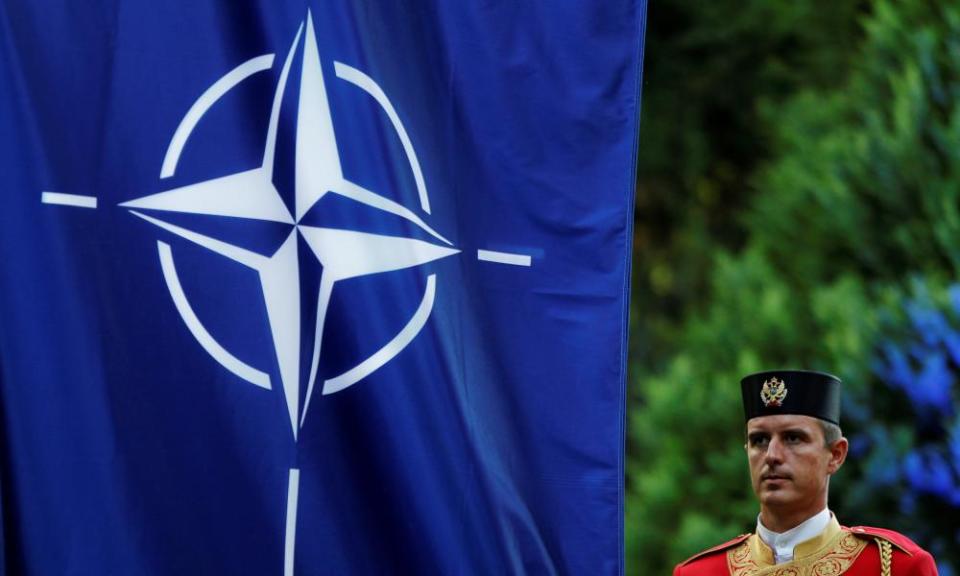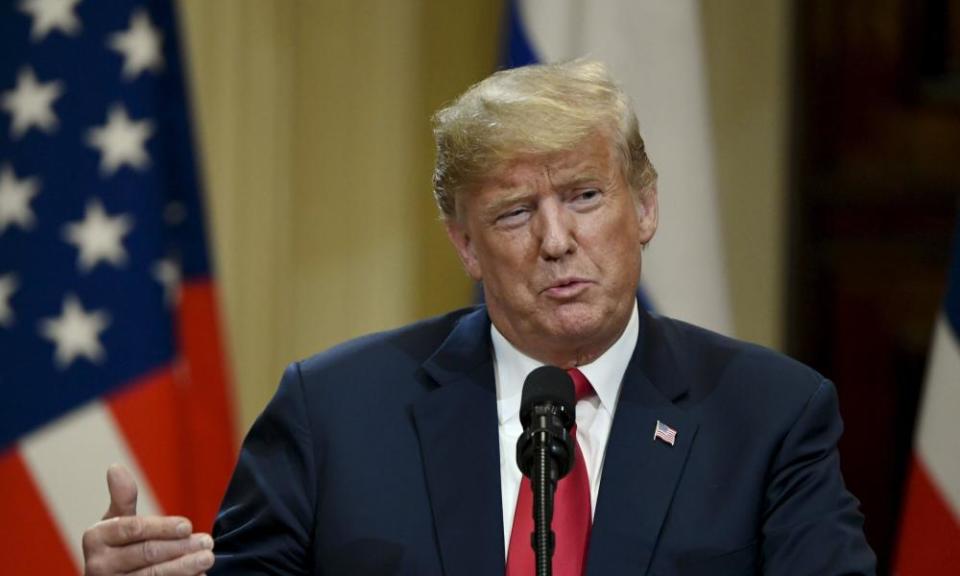How Trump destabilised Montenegro with a few words

In the height of summer, Montenegrins are usually preoccupied with cooling themselves off along the Adriatic coast. This year, the heat has been turned up even more, after Donald Trump characterised the tiny Balkan nation’s people as “very aggressive” and capable of sparking a third world war.
Barely a year since the former Yugoslav republic joined Nato, Trump’s remarks – in an interview with Fox News on Tuesday – have been met with a mix of mockery, contempt and outright disbelief. Publicly and privately officials admit that the US president’s latest verbal volley has hurt.
Asked by host Tucker Carlson in a conversation about Nato’s common defence policy: “Why should my son go to Montenegro to defend it from attack?” the US president replied: “I understand what you’re saying. I’ve asked the same question.
“Montenegro is a tiny country with very strong people ... They’re very aggressive people. They may get aggressive, and congratulations, you’re in world war three.”

On Thursday, after 48 hours of remaining tight-lipped, the Montenegrin government hit back, defending its role as “a stabilising state” and saying it was proud of belonging to the 29-member military alliance.
“Today as a new Nato member and candidate for EU membership Montenegro contributes to peace and stability not only on the European continent but worldwide, along with US soldiers in Afghanistan,” it said. “We build friendships, and we have not lost a single one … in today’s world, it does not matter how big or small you are, but to what extent you cherish the values of freedom, solidarity and democracy.”
Earlier, sources had sought to play down the comments, citing the possible impact on the 629,000-strong country in a post-Trumpian world of shifting susceptibilities and global insecurity.
For a government that pushed hard for Nato membership – selling accession to the alliance as a guarantee of future security despite immense internal opposition among a people that had briefly been the target of Nato bombing in 1999 – Trump’s implication that the strategic state is unworthy of defence has both beggared belief and elicited disappointment.
“Far be it for me to comment on what a US president says, but he seems to be out of touch with US policy goals and not know what Nato is,” said Vesko Garčević, Montenegro’s former ambassador to Nato, who oversaw the country’s accession talks. “Membership was a strategic shift,” he told the Guardian from Podgorica, the country’s capital. “It was about joining the western club, embracing western values, not only about security. For Montenegro and the alliance it was a huge achievement, a very big success.”
Like most Balkan experts, Garčević fears that Trump’s intervention, so soon after his meeting with the Russian president, Vladimir Putin, in Helsinki, not only mirrors Moscow’s anti-Nato messaging but plays directly into Putin’s hands.
“To have the president of the US, the most powerful member of the alliance, question Nato’s principle of solidarity can only work in Russia’s favour,” he said. “One should ‘never say never’ when it comes to Trump … but this is insane. I can tell you these days we are thinking about our holidays, heading to resorts along the Adriatic, not waging world war three.”
With EU accession processes for most western Balkan states in stasis, Putin may be tempted to fill the space by testing the willingness of Nato members to respond in the event of another being attacked, say analysts.
“Trump’s remarks further undermine Nato and his message may be interpreted in Moscow as a clear sign that the current US government will not support its allies, should Moscow seek to destabilise the region by whatever means,” said Kenneth Morrison, professor of modern south-east European history at De Montfort University in Leicester. “What’s important for the region is certainty and a clear sense of direction for the western Balkans – a clear EU perspective and, for those that seek it, Nato membership.”
Few countries as small as Montenegro – the state has an army of around 2,000 with 400 reservists – has annoyed Moscow as much. When Podgorica signed up to the alliance it completed an arc that ran along the eastern Adriatic, from Croatia to Greece, that Nato would control.
Infuriated that the west should encroach on areas long viewed as falling within its own sphere of influence, Moscow reacted with barely concealed fury, going so far as to support a coup in 2016 against the government of then prime minister, Milo Đukanović. Although the putsch ultimately failed it had been hoped that with Đukanović’s assassination, a pro-Russian party would be brought to power.
“As the Montenegrin government drew closer to Nato membership, it also supported EU sanctions against Russia. There was a steady decline in Montenegrin-Russian relations, which traditionally had been very good, from 2014 onward,” said Morrison.
Podgorica’s support for EU sanctions against Russia, despite close commercial, political and cultural ties, had been cause for sharp rebuke with Russia’s ambassador to Serbia, Aleksandar Čepurin, likening Montenegro’s attempts to join Nato to “a monkey chasing a banana”.
As such, the US president’s comments not only undermined the government but could also embolden the country’s pro-Russian and anti-Nato opposition. “Such comments only bolster the opposition Democratic Front, who have been alleged to have links with the Russian government,” Morrison said. “Many of them were anti-Nato and pro-Trump, largely because of Trump’s campaign rhetoric about what he regarded as the unviability of Nato.”
Wesley Clark, a retired US army general and former Nato supreme allied commander, went further, voicing concerns that Trump’s remarks could destablise the traditionally volatile Balkan region. “Worrying to hear Trump use Russian talking points with Tucker Carlson, about Montenegro,” he said in a tweet referring to Trump’s Fox News interviewer. “Montenegro has been under continuous pressure by Russia for more than a decade. Trump’s comments weaken Nato, give Russia a license to cause trouble and thereby actually increase the risks of renewed conflict in the Balkans.”

 Yahoo News
Yahoo News 